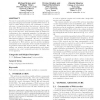Free Online Productivity Tools
i2Speak
i2Symbol
i2OCR
iTex2Img
iWeb2Print
iWeb2Shot
i2Type
iPdf2Split
iPdf2Merge
i2Bopomofo
i2Arabic
i2Style
i2Image
i2PDF
iLatex2Rtf
Sci2ools
112
click to vote
WWW
2008
ACM
2008
ACM
Using context to enable semantic mediation in web service communities
The use of communities provides a scalable solution for gathering and managing functionally-equivalent Web services. In order to ensure single access to the community, a community uses a common interface that acts as a proxy and selects other Web services in the community. However, Web services adopt different semantics for representing the data they receive and send. These semantics must be adapted to conforming to the community semantics. In this paper, we present a solution to this problem. Our solution is based on the use of context in order to explicitly describe semantic discrepancies within a community. We rely on a semantic annotation of WSDL descriptions to describe the semantics attached to Web services, and we provide mediation mechanisms at the community level to handle semantic heterogeneities between Web services and the community. We validate our solution through implementation and experimentation over a test community and show the limitations of our approach. Categorie...
Related Content
| Added | 21 Nov 2009 |
| Updated | 21 Nov 2009 |
| Type | Conference |
| Year | 2008 |
| Where | WWW |
| Authors | Michael Mrissa, Philippe Thiran, Chirine Ghedira, Djamal Benslimane, Zakaria Maamar |
Comments (0)

